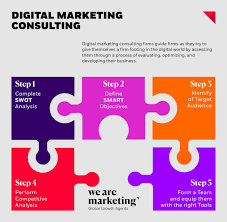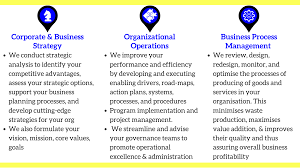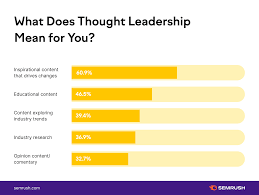Unleashing Success: How Digital Strategy Consultants Drive Business Growth in the Digital Age
Digital Strategy Consultants: Unlocking the Power of the Digital Age
In today’s fast-paced and ever-evolving business landscape, having a strong digital presence has become a necessity for companies aiming to thrive and succeed. However, navigating the complex world of digital marketing and strategy can be overwhelming for many businesses. This is where digital strategy consultants come into play, offering their expertise to help organizations unlock the power of the digital age.
Digital strategy consultants are professionals who specialize in developing and implementing effective strategies that leverage digital channels to achieve business goals. They possess a deep understanding of the digital ecosystem, including social media platforms, search engine optimization (SEO), content marketing, online advertising, and more.
One of the key advantages of working with digital strategy consultants is their ability to provide an objective and fresh perspective on your company’s digital efforts. They conduct comprehensive audits and assessments to identify areas for improvement and growth opportunities. By analyzing your target audience, competitors, and industry trends, they create tailored strategies that align with your specific objectives.
Digital strategy consultants are skilled at crafting compelling brand stories that resonate with consumers in the online space. They help businesses define their unique value proposition and develop a consistent brand identity across various digital touchpoints. This ensures that your company stands out from the competition and builds strong connections with your target audience.
Moreover, these consultants possess extensive knowledge of data analytics tools and techniques. They leverage data-driven insights to track key performance indicators (KPIs) and measure the success of your digital campaigns. By monitoring metrics such as website traffic, conversion rates, engagement levels, and customer feedback, they continuously optimize strategies for maximum impact.
Another significant advantage of partnering with digital strategy consultants is their ability to stay up-to-date with the latest industry trends and technologies. The digital landscape is constantly evolving, with new platforms emerging regularly. Digital strategy consultants keep a finger on the pulse of these developments so that they can recommend innovative solutions that keep your business ahead of the curve.
Furthermore, digital strategy consultants provide valuable guidance during times of crisis or change. Whether it’s managing a social media backlash, mitigating a reputational crisis, or navigating a digital transformation process, their expertise and experience can be invaluable. They help businesses proactively address challenges and seize opportunities to maintain a positive digital presence.
In conclusion, the role of digital strategy consultants in today’s business world cannot be overstated. Their expertise in developing and implementing effective digital strategies empowers companies to thrive in the digital age. By leveraging their knowledge of the ever-changing digital landscape, these consultants help organizations build strong brands, engage with customers effectively, and achieve their business goals.
If your company is ready to embrace the power of the digital age and unlock its full potential, it may be time to consider partnering with a trusted digital strategy consultant. Together, you can navigate the complexities of the digital world and create a winning strategy that drives growth and success for your business.
6 Essential Tips for Hiring a Digital Strategy Consultant in the UK
- Do your research
- Ask questions
- Set a budget
- Look for someone experienced
- Consider location
- Discuss timelines & deliverables
Do your research
When it comes to hiring digital strategy consultants, one tip stands out above the rest: do your research. In today’s digital landscape, where businesses are constantly vying for attention and success online, choosing the right consultant can make all the difference.
Researching digital strategy consultants allows you to gain valuable insights into their expertise, experience, and track record. Start by exploring their website and portfolio to get a sense of the projects they have worked on and the industries they specialize in. Look for case studies or client testimonials that showcase their ability to deliver results.
Additionally, take the time to read reviews and ratings from previous clients. This will give you an idea of their reputation and whether they have a history of providing excellent service. Online platforms such as Google Reviews or LinkedIn can be valuable sources of feedback from real clients.
Furthermore, don’t hesitate to reach out and ask for references or speak directly with past clients. This will provide an opportunity to gain firsthand insights into their working style, communication skills, and ability to meet deadlines. A reputable consultant will be more than willing to provide references and answer any questions you may have.
During your research process, consider the specific needs of your business. Look for consultants who have experience working with companies similar in size or industry focus. This ensures that they understand the unique challenges you face and can tailor their strategies accordingly.
It’s also important to assess their knowledge of current trends and technologies in the digital space. Digital strategy is a rapidly evolving field, so finding a consultant who stays up-to-date with industry advancements is crucial. They should be able to recommend innovative solutions that align with your business goals.
Finally, don’t forget about chemistry. Building a strong working relationship with your digital strategy consultant is essential for success. Pay attention to how well you communicate during initial conversations or meetings. Look for someone who listens attentively, understands your vision, and demonstrates enthusiasm for your project.
In conclusion, doing your research is a vital step when selecting a digital strategy consultant. By thoroughly examining their expertise, reputation, and fit with your business, you can make an informed decision that sets the stage for a successful partnership. Remember, investing time in research upfront will pay off in the long run as you work towards achieving your digital goals.
Ask questions
When it comes to working with digital strategy consultants, one tip that can make a significant difference is to ask questions. Digital strategy consultants are experts in their field, and their knowledge can be a valuable asset for your business. By actively engaging with them and seeking clarification on any uncertainties you may have, you can gain deeper insights and make more informed decisions.
Asking questions allows you to fully understand the strategies being proposed and the reasoning behind them. It helps you grasp the potential benefits and risks associated with different digital marketing approaches. Through this dialogue, you can also align your objectives with the consultant’s recommendations, ensuring that everyone is on the same page.
Moreover, asking questions fosters a collaborative environment where ideas can be exchanged freely. Consultants appreciate clients who are actively involved in the process and show a genuine interest in understanding the intricacies of digital strategy. By engaging in meaningful conversations, you contribute to shaping strategies that are tailored specifically to your business needs.
Remember that no question is too small or insignificant. Digital strategy consultants are there to guide you through the complexities of the digital landscape, so take advantage of their expertise. Whether it’s about specific tactics, data analysis methods, or industry trends, don’t hesitate to seek clarification.
Asking questions also demonstrates your commitment to continuous learning and improvement. The digital landscape is constantly evolving, and staying informed about new technologies and emerging trends is crucial for success. By actively engaging with your digital strategy consultant through questioning, you not only gain valuable knowledge but also develop a mindset of adaptability and growth.
In conclusion, asking questions is an essential tip when working with digital strategy consultants. It promotes collaboration, deepens understanding, and ensures alignment between your business objectives and the proposed strategies. So don’t shy away from seeking clarification or exploring new ideas – embrace curiosity and engage in meaningful conversations with your consultant. Together, you can unlock the full potential of your digital efforts and drive success for your business.
Set a budget
Setting a Budget: A Crucial Step in Harnessing the Expertise of Digital Strategy Consultants
When it comes to working with digital strategy consultants, one key tip stands out: set a budget. While it may seem obvious, many businesses overlook this crucial step, potentially hindering their ability to fully harness the expertise and services of these professionals.
Setting a budget is essential for several reasons. Firstly, it helps you define the scope of your digital strategy project and ensures that both you and the consultant are on the same page from the start. By clearly outlining your financial limitations, you can work together to develop a realistic plan that aligns with your goals and resources.
Moreover, setting a budget allows you to prioritize your digital initiatives effectively. Digital strategy consultants can provide valuable insights into different strategies and tactics that can help achieve your objectives. However, without a budget in place, it can be challenging to determine which initiatives are feasible and will deliver the best return on investment (ROI).
A well-defined budget also helps avoid any unexpected costs or surprises along the way. It allows for better financial planning and ensures that both parties have a clear understanding of what is included in the scope of work. This transparency fosters trust between you and the consultant, enabling smoother collaboration throughout the project.
Additionally, setting a budget encourages accountability and cost-consciousness. With finite resources allocated to your digital strategy efforts, you are more likely to scrutinize expenses carefully and make informed decisions about where to invest your funds. This level of financial discipline ensures that every pound spent contributes towards achieving your desired outcomes.
Furthermore, having a budget in place enables you to measure ROI accurately. By tracking expenses against expected results, you can evaluate the effectiveness of different strategies and make data-driven decisions for future campaigns or projects. This iterative approach allows for continuous improvement and optimization of your digital efforts.
Lastly, setting a budget empowers both parties to manage expectations effectively. It establishes realistic boundaries and ensures that the proposed strategies and deliverables are feasible within the allocated resources. This helps avoid potential misunderstandings or disappointments down the line, fostering a more productive and positive working relationship with your digital strategy consultants.
In conclusion, setting a budget is an essential tip to consider when engaging digital strategy consultants. It provides clarity, prioritization, accountability, and enables accurate measurement of ROI. By taking this crucial step, you can maximize the value of your partnership with digital strategy consultants and achieve your business objectives effectively in the ever-evolving digital landscape.
Look for someone experienced
When it comes to choosing a digital strategy consultant for your business, one tip stands out above the rest: look for someone experienced. The world of digital marketing is ever-changing and complex, so having an experienced consultant by your side can make all the difference.
An experienced digital strategy consultant brings a wealth of knowledge and expertise to the table. They have worked with various clients across different industries, allowing them to understand the nuances and challenges that businesses face in the digital realm. Their experience enables them to identify trends, anticipate changes, and develop strategies that deliver results.
Moreover, an experienced consultant has likely encountered a wide range of scenarios and obstacles throughout their career. This means they have honed their problem-solving skills and can navigate challenges more effectively. They have learned from both successes and failures, giving them valuable insights that they can apply to your specific business needs.
Another advantage of working with an experienced digital strategy consultant is their established network. Over time, they have built relationships with other professionals in the industry, including designers, developers, content creators, and more. This network can be invaluable when it comes to executing your digital strategy effectively and efficiently.
Furthermore, an experienced consultant understands the importance of staying updated with the latest trends and technologies in the digital landscape. They continuously invest in their own professional development to ensure they are equipped with the most relevant knowledge and skills. This commitment to learning allows them to provide you with cutting-edge strategies that align with current best practices.
When considering a digital strategy consultant’s experience, it’s also essential to evaluate their track record. Look for case studies or testimonials that showcase their past successes. A proven track record indicates that they have delivered tangible results for their clients in terms of increased website traffic, improved conversion rates, enhanced brand visibility, or other key performance indicators.
In conclusion, when searching for a digital strategy consultant for your business, prioritizing experience is crucial. An experienced consultant brings a deep understanding of the digital landscape, problem-solving skills, a valuable network, and a track record of success. By partnering with an experienced professional, you can feel confident that your digital strategy will be in capable hands, leading to increased growth and success for your business.
Consider location
Consider Location: The Strategic Advantage of Local Digital Strategy Consultants
When it comes to choosing a digital strategy consultant, one often overlooked but critical factor is location. While the digital landscape allows for remote collaboration, there are distinct advantages to working with a local consultant that should not be underestimated.
First and foremost, local digital strategy consultants possess an in-depth understanding of the local market dynamics. They are familiar with the preferences, behaviours, and trends specific to your region. This knowledge enables them to tailor strategies that resonate with your target audience and drive better results.
Moreover, local consultants have a pulse on the local competition. They understand the unique challenges and opportunities within your industry and geographical area. This insight allows them to develop strategies that differentiate your business from competitors and seize market advantages effectively.
Working with a local consultant also facilitates seamless communication and collaboration. Time zone differences can often pose challenges when working with consultants from distant locations. By choosing a consultant in close proximity, you can ensure more convenient communication channels and timely responses to your queries or concerns.
Another significant advantage of hiring local digital strategy consultants is their ability to tap into their existing network of contacts within the community. These connections can provide valuable resources, such as potential partnerships or influencers who can amplify your brand’s reach locally. Leveraging these relationships can help you establish a stronger presence in your target market.
Furthermore, local consultants are well-versed in any regional regulations or legal considerations that may impact your digital strategy. They understand the nuances of compliance requirements specific to your area and can guide you in navigating potential legal pitfalls effectively.
Lastly, supporting local businesses by hiring local consultants fosters economic growth within your community. By investing in nearby expertise, you contribute to job creation and bolster the local economy—a win-win situation for both parties involved.
In conclusion, considering location when selecting a digital strategy consultant offers strategic advantages that should not be overlooked. Local consultants bring valuable insights into the regional market dynamics, competition, and legal considerations. Their proximity allows for seamless communication and collaboration, while their existing network of contacts can provide additional resources. Moreover, supporting local businesses contributes to the growth of your community. So, when choosing a digital strategy consultant, don’t forget to consider the strategic advantage of going local.
Discuss timelines & deliverables
When it comes to working with digital strategy consultants, one important tip is to discuss timelines and deliverables upfront. Clear communication and mutual understanding of project timelines and expected deliverables are crucial for a successful collaboration.
Digital strategy consultants can help businesses achieve their goals by developing and implementing effective strategies in the digital realm. However, without a clear understanding of project timelines and deliverables, both parties may face challenges and potential misunderstandings.
By discussing timelines, you can establish realistic expectations for project milestones and completion. This ensures that everyone involved understands the timeframes involved in executing the digital strategy. It allows for proper planning, resource allocation, and coordination between your team and the consultants.
In addition to timelines, discussing deliverables is equally important. Clearly defining what you expect from the digital strategy consultants at different stages of the project helps align their efforts with your business objectives. This includes specifying key outcomes, reports, presentations, or any other tangible outputs that you anticipate throughout the engagement.
When discussing deliverables, it’s essential to be specific about your requirements. Clearly articulate what you need from the consultants in terms of content, format, level of detail, and any other relevant factors. This clarity ensures that both parties have a shared understanding of what will be delivered at each stage.
Having these discussions upfront also allows for flexibility and adjustments along the way. As projects progress, priorities may shift or unforeseen circumstances may arise. By openly discussing timelines and deliverables from the start, you create a foundation for open communication throughout the engagement. This enables both parties to adapt as needed while staying aligned with overarching goals.
Remember that effective collaboration between your team and digital strategy consultants is built on trust and transparency. Openly discussing timelines and deliverables fosters a positive working relationship where all parties are clear on expectations. It sets the stage for successful outcomes that drive your business forward in the digital landscape.
In conclusion, when engaging with digital strategy consultants, take the time to discuss timelines and deliverables upfront. This ensures that both parties have a shared understanding of project milestones, expected completion dates, and tangible outputs. By being clear and specific in your discussions, you set the stage for a successful collaboration that yields impactful results in the digital realm.






